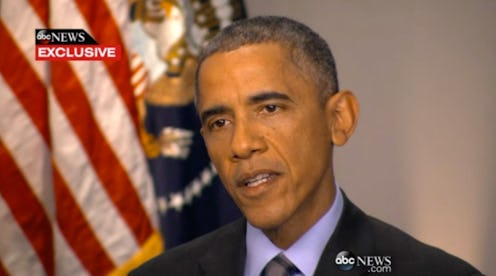News
President Obama Talks Iranian Nuclear Negotiations

It's easy to get so caught up in domestic politics that you lose sight of how many important things the President and his cabinet are dealing with worldwide. A prime example: negotiations are ongoing on a deal between the U.S. (as well as Russia, the United Kingdom, Germany, France, and China) and Iran, to exchange a reduction in sanctions for restrictions on its nuclear program. Talking to ABC News host George Stephanopoulos, President Obama said a nuclear deal could change Iran's relationship with America and with the international community, though he conceded that the two countries remained far apart in numerous regards.
Appearing on Stephanopoulos' This Week Sunday, in an interview that was taped Friday, Obama expressed a full-throated belief in just how significant a full-fledged deal with Iran could be for the country's reputation on the world stage, while still being keenly aware of the obstacles. With U.S. Secretary of State John Kerry still in active negotiations in Vienna, and the Monday deadline to reach an agreement imminent, the outcome is still anything but certain. According to the BBC, Iranian diplomats and officials from the six nations are considering extending that deadline, with a comprehensive deal considered a virtual impossibility to be completed so soon.
When Stephanopoulos asked Obama if a signed nuclear deal could mean Iran "joining the fight against ISIS," the President made it clear he didn't anticipate that kind of chummy strategic alliance, even as there's potential for dramatic diplomatic progress.
We're not going to be, I think anytime soon, coordinating military activities with Iran. Because keep in mind, even if we solve the nuclear problem, we still have the problem of Iran sponsoring terrorist activities in the region, we still have problems in terms of their attitude toward friends like Israel. What a deal would do is take a big piece of business off the table, and perhaps begin a long process in which not just the relationship between Iran and us, but the relationship between Iran and the world, and the region, begins to change.
Iran's nuclear program has been a source of contention and consternation in the international community for years, amid widespread suspicion and belief that it aspires to produce nuclear weapons. iran denies this, and has asserted that they only wish to produce nuclear energy. The fervor to thwart any possibility of Iran acquiring such weapons has led to heavy sanctions being imposed on the country, as well as assassinations and attempts made against officials and scientists working in the nuclear field.
Obama also voiced some belief that he'd be able to convince Congress to back a deal with Iran, and the American people as well, provided it's a deal that's "verifiable, and assures that Iran does not have breakout capacity." And, he seems to think Iranian President Hassan Rouhani may feel similarly, despite his own constraints.
Iran's not like North Korea, a country that's just completely isolated and completely dysfunctional. So they have the opportunity, I think, to really thrive. I suspect President Rouhani would like to seize that opportunity, but in the end he's going to have to deal with his politics at home, and he's not the ultimate decider inside of Iran, the Supreme Leader is.
Images: ABC News; Getty Images